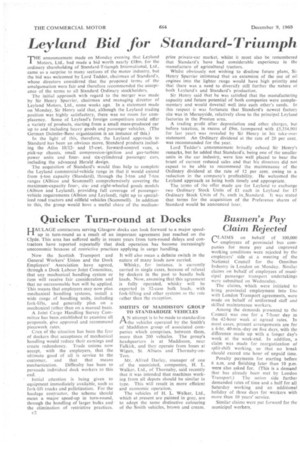Quicker Turn-round at Docks
Page 38

If you've noticed an error in this article please click here to report it so we can fix it.
HAULAGE contractors serving Glasgow docks can look forward to a major speedup in turn-round as a result of an important agreement just reached on the Clyde. This area has suffered sadly in recent years from turn-round delays and contractors have reported repeatedly that dock operation has become increasingly uneconomic because of restrictive practices applying in cargo handling.
Now the Scottish Transport • and General Workers' Union. and the Dock Employers' Association have agreed, through a Dock Labour Joint Committee, that any mechanical handling system or item will receive fair consideration and that no unreasonable ban will be applied. This means that employers may now plan mechanical handling systems, install a wide range of handling units, including fork-lifts, and generally plan on a mechaqical rather than on a manual basis.
A Joint Cargo Handling Survey Committee has beerLestablished to examine all proposals, give approval and recommend piecework rates.
Crux of the situation has been the fear of dockers that acceptance of mechanical handling would reduce their earnings and create redundancy. Trade unions now accept, with the employers, that the ultimate good of all is service to the customer, and that that means mechanization. Difficulty has been to persuade individual dock workers to this end.
Initial attention is being given to equipment immediately available, such as fork-lift trucks and palletization. For the haulage contractor, the scheme should mean a major speed-up in turn-round, through the handling of larger bulks and the elimination of restrictive practices.
c2 It will also mean a definite switch in the nature of many loads now carried.
Whisky, for instance, is currently carried in single cases, because of refusal by dockers in the past to handle bulk loads. Now, assuming that this agreement is fully operated, whisky will be exported in 32-case bulk loads, with fork-lifting and other systems as the rule rather than the exception.
SMITH'S OF MADDISTON GROUP TO STANDARDIZE VEHICLES
AA N attempt is to be made to standardize the vehicles operated by the Smith's of Maddiston group of associated companies which comprises, between them, more than 200 vehicles. The group's headquarters is at Maddiston, near Falkirk, and they operate from bases at Wigan. St. Albans and Thornaby-onTees.
Mr, Alfred Darley, manager of one of the associated, companies, H. L. Walker, Ltd., of Thornaby, said recently that it was intended that machines working from all depots should be similar in type. This will result in more efficient and economic operation.
The vehicles of H. L. Walker, Ltd., which at present are painted in grey, are to adopt the same distinctive colouring of the Smith vehicles, brown and cream.
























































































































